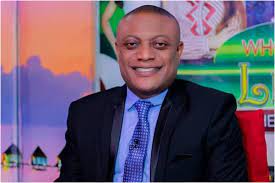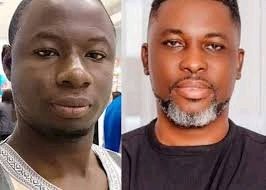
Lawyer Maurice Ampaw, has openly criticized Prophet Stephen Adom Kyei Duah, leader of the Believers Worship Center, after previously being a supporter of his ministry. Ampaw, who had once expressed admiration for the religious leader’s work and teachings, now accuses Prophet Kyei Duah of lacking the spiritual authority he claims, particularly when it comes to influencing or selecting the next president of Ghana.
This surprising shift in opinion from Maurice Ampaw comes after a visit to the prophet’s church, where he had the opportunity to witness the operations of the ministry firsthand. Ampaw has made it clear that his views changed significantly following this encounter, and he now feels betrayed by the prophet, whom he had initially respected.
Ampaw’s comments have stirred controversy among the followers of Prophet Adom Kyei Duah, many of whom hold the prophet in high esteem, believing in his spiritual gifts and prophetic declarations. The lawyer’s sudden public critique, however, has cast a shadow of doubt over the legitimacy of some of the prophet’s proclamations, particularly his alleged claims of being able to influence national leadership and political outcomes.
Lawyer Maurice Ampaw did not shy away from making bold statements regarding Prophet Adom Kyei Duah’s influence. He argued that the prophet does not have the spiritual or moral authority to choose who should lead the country, claiming that such decisions are best left in the hands of the people through democratic processes. Ampaw stated that religion and politics should remain separate, stressing that no religious leader should have the power to dictate the outcome of elections or assume a role as a kingmaker in Ghana’s political scene.
Ampaw further expressed disappointment in the fact that some religious leaders, including Prophet Adom Kyei Duah, have ventured into the political space, using their platforms to influence their congregations’ voting decisions. According to him, this practice blurs the line between faith and governance and poses a potential threat to the democratic system of the country.
During his public address, Ampaw delved into his personal experience after visiting Prophet Kyei Duah’s church, suggesting that there were certain inconsistencies and practices within the church that raised red flags for him. He hinted at the possibility of manipulation within the ministry, asserting that some religious leaders are taking advantage of their followers’ faith for personal gain. This, Ampaw suggested, may be one of the reasons for his disillusionment with the prophet.
The lawyer’s statements have ignited a debate, particularly among members of the Believers Worship Center, some of whom remain loyal to Prophet Adom Kyei Duah and have come to his defense. Supporters of the prophet argue that he is a man of God who has been divinely appointed to lead his flock and provide spiritual guidance, including advice on matters of governance. They believe that his prophecies and declarations are inspired by a higher power, and that Maurice Ampaw’s criticisms are unfounded and stem from personal bias.
Despite the controversy, Maurice Ampaw has stood firm in his position, warning the public to be cautious of religious leaders who involve themselves in political affairs. He has urged Ghanaians to trust in the democratic process and not be swayed by religious figures claiming to have the divine authority to influence leadership.
As this public exchange continues to unfold, the larger conversation surrounding the role of religious leaders in politics gains momentum in Ghana. While some believe that spiritual leaders should guide their congregations in all aspects of life, including political decisions, others, like Lawyer Maurice Ampaw, argue that mixing religion with politics is dangerous and could undermine the integrity of the democratic system.
Source: m.dailyadvent.com




